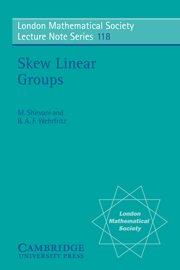Book contents
- Frontmatter
- Contents
- FOREWORD
- 1 BASIC CONCEPTS
- 2 FINITE AND LOCALLY FINITE GROUPS
- 3 LOCALLY FINITE-DIMENSIONAL DIVISION ALGEBRAS
- 4 DIVISION RINGS ASSOCIATED WITH POLYCYCLIC GROUPS
- 5 NORMAL SUBGROUPS OF ABSOLUTELY IRREDUCIBLE GROUPS
- 6 AN APPLICATION TO GROUP RINGS
- BIBLIOGRAPHY
- NOTATION INDEX
- AUTHOR INDEX
- GENERAL INDEX
2 - FINITE AND LOCALLY FINITE GROUPS
Published online by Cambridge University Press: 27 October 2009
- Frontmatter
- Contents
- FOREWORD
- 1 BASIC CONCEPTS
- 2 FINITE AND LOCALLY FINITE GROUPS
- 3 LOCALLY FINITE-DIMENSIONAL DIVISION ALGEBRAS
- 4 DIVISION RINGS ASSOCIATED WITH POLYCYCLIC GROUPS
- 5 NORMAL SUBGROUPS OF ABSOLUTELY IRREDUCIBLE GROUPS
- 6 AN APPLICATION TO GROUP RINGS
- BIBLIOGRAPHY
- NOTATION INDEX
- AUTHOR INDEX
- GENERAL INDEX
Summary
The titles of this chapter and its subsections are in the main self-explanatory The difficult parts of Chapter 2 concern finite skew linear groups. The generalizations to locally finite groups are usually routine. In the long Section 1 we classify the finite skew linear groups of degree 1, that is, the finite multiplicative subgroups of division rings. Historically this was the foundation of our subject, being now some thirty years old. The positive-characteristic case is almost trivial, whereas the zerocharacteristic case is very substantial indeed. The details of the proofs of Section 2.1 will not be required later, but the reader should at least read the first four pages of this section before passing on.
The very brief Section 2.2 collects together a few results on Schur indices required in the later sections. Section 2.3 swiftly deals with finite and locally finite skew linear groups of positive characteristic. The fundamental theorems on finite skew linear groups of characteristic zero are in Section 2.4, while the final Section 2.5 contains our general discussion of finite and locally finite skew linear groups of characterisitic zero.
FINITE SUBGROUPS OF DIVISION RINGS
It is well-known that the only finite subgroups of the multiplicative group of a field of characteristic p ≥ 0 are the cyclic p′-groups. The problem of classifying the finite subgroups of the multiplicative groups of division rings was first raised by Herstein in 1953, who gave the solution in the positive characteristic case.
- Type
- Chapter
- Information
- Skew Linear Groups , pp. 44 - 79Publisher: Cambridge University PressPrint publication year: 1987



